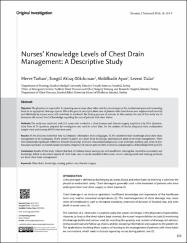| dc.contributor.author | Tarhan, Merve | |
| dc.contributor.author | Akbaş Gökduman, Songül | |
| dc.contributor.author | Ayan, Abdulkadir | |
| dc.contributor.author | Dalar, Levent | |
| dc.date.accessioned | 10.07.201910:49:13 | |
| dc.date.accessioned | 2019-07-10T19:52:14Z | |
| dc.date.available | 10.07.201910:49:13 | |
| dc.date.available | 2019-07-10T19:52:14Z | |
| dc.date.issued | 2016 | en_US |
| dc.identifier.citation | Tarhan, M., Akbaş Gökduman, S., Ayan, A. ve Dalar, L. (2016). Nurses' knowledge levels of chest drain management: A descriptive study. Eurasian Journal of Pulmonology, 18(3), 153-159. https://dx.doi.org/10.5152/ejp.2016.97269 | en_US |
| dc.identifier.issn | 2148-3620 | |
| dc.identifier.issn | 2148-5402 | |
| dc.identifier.uri | https://dx.doi.org/10.5152/ejp.2016.97269 | |
| dc.identifier.uri | https://hdl.handle.net/20.500.12511/2366 | |
| dc.description | WOS: 000391006500009 | en_US |
| dc.description.abstract | Objective: The physician is responsible for inserting one or more chest tubes into the pleural space or the mediastinal space and connecting them to an appropriate drainage system. When the general principles about care of patients with chest drains were implemented correctly and effectively by nurses, nurse will contribute to accelerate the healing process of patients. In this context, the aim of this study was to determine the nurses' level of knowledge regarding the care of patients with chest drains. Methods: The study was conducted with 153 nurses who worked in a chest diseases and thoracic surgery hospital in July 2014. Questionnaire form of 35 questions prepared by investigators was used to collect data. For the analysis of results, frequency tests, independent sample t-test and oneway ANOVA test were used. Results: 69.3% of nurses stated that they had obtained information from colleguages. 35.3% considered their knowledge about chest drain management to be inadequate. 55.6% scored 13 points and above from knowledge questionnaire about chest drain management. There were statistically significant difference between knowledge level and educational background, clinic work type, working unit, years of professional experience and institutional experience, frequency of contact patients with chest drain and perception of knowledge level (p<0.05). Conclusion: Results of this study indicate that lack of evidence-based nursing care and insufficient training has resulted in uncertainty and knowledge deficit in important aspects of chest drain care. It can be concluded that nurses receive training needs and training protocols are about chest drain management. | en_US |
| dc.language.iso | eng | en_US |
| dc.publisher | AVES | en_US |
| dc.rights | info:eu-repo/semantics/openAccess | en_US |
| dc.rights | Attribution-NonCommercial 4.0 International | * |
| dc.rights.uri | https://creativecommons.org/licenses/by-nc/4.0/ | * |
| dc.subject | Chest Drain | en_US |
| dc.subject | Knowledge | en_US |
| dc.subject | Nursing | en_US |
| dc.subject | Patient Care | en_US |
| dc.subject | Thoracic Surgery | en_US |
| dc.title | Nurses' knowledge levels of chest drain management: A descriptive study | en_US |
| dc.type | article | en_US |
| dc.relation.ispartof | Eurasian Journal of Pulmonology | en_US |
| dc.department | İstanbul Medipol Üniversitesi, Sağlık Bilimleri Fakültesi, Hemşirelik Bölümü | en_US |
| dc.authorid | 0000-0002-9841-4708 | en_US |
| dc.identifier.volume | 18 | en_US |
| dc.identifier.issue | 3 | en_US |
| dc.identifier.startpage | 153 | en_US |
| dc.identifier.endpage | 159 | en_US |
| dc.relation.publicationcategory | Makale - Uluslararası Hakemli Dergi - Kurum Öğretim Elemanı | en_US |
| dc.identifier.doi | 10.5152/ejp.2016.97269 | en_US |



















